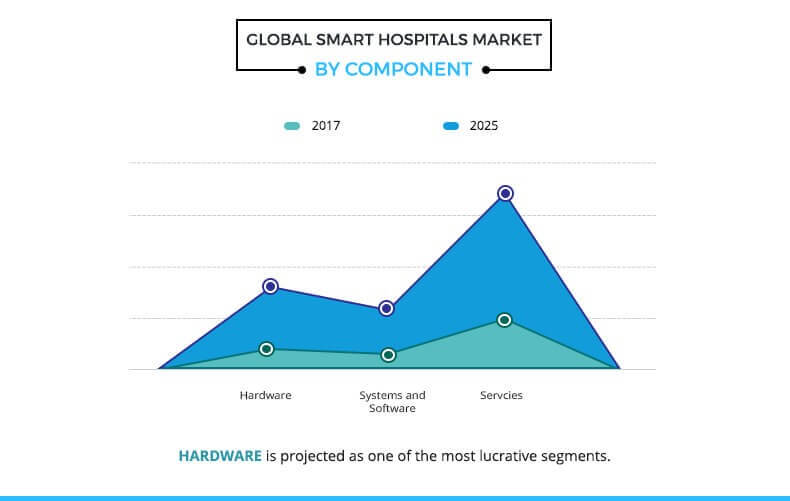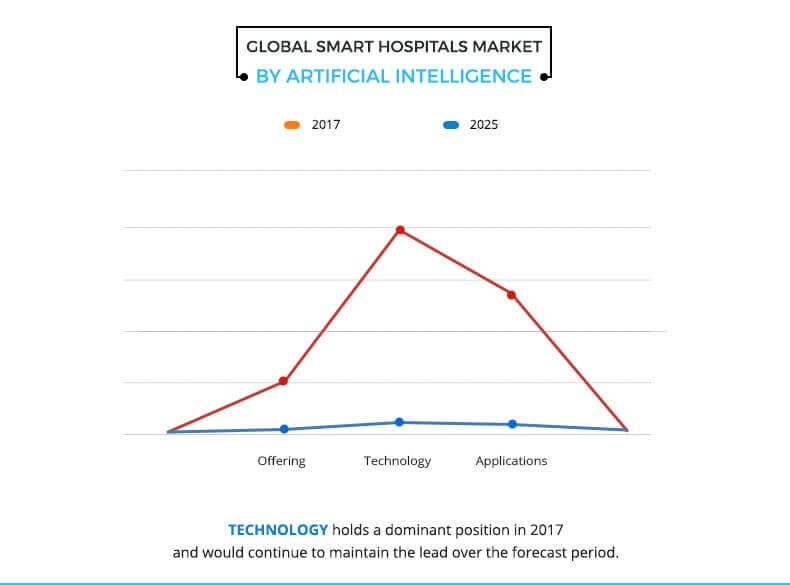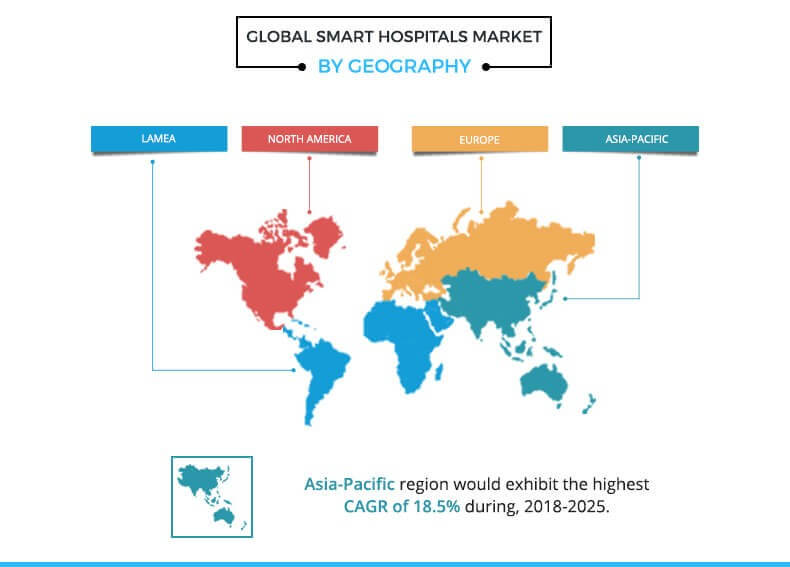Smart Hospitals Market Research, 2025
Smart hospitals are medical settings equipped with advanced devices and software for reducing the workload and minimizing the cost associated with all the procedures included in a hospital. Smart hospitals are generally depended on internet of things and artificial intelligence. The global smart hospitals market was valued at $16,925 million in 2017, and is expected to reach $58,777 million by 2025 at a CAGR of 17.3% during the forecast period.
The increase in technological advancements in healthcare coupled with the rise in need for cost-effective solutions in hospitals drive the growth of the market. However, the lack of governance standards and lack of competence in deploying IoT solutions in hospitals restrain the market growth. Moreover, the increase in investments in healthcare sector, especially in the developing economies create lucrative opportunities in the market.
The global smart hospitals market is segmented based on component, product, connectivity, application, and artificial intelligence. Based on component, the market is divided into hardware, system & software, and service. Based on product, the market is classified into smart pills, mhealth, telemedicine, and electronic health records. Further, based on connectivity, the market is bifurcated into wired and wireless. The wireless segment in further categorized into Wi-Fi, RFID, Bluetooth, and others. Based on application, the market is segmented into remote medicine management, medical assistance, medical connected imaging, electronic health record & clinical workflow, and others. Based on artificial intelligence, the market is segmented into offering, technology, and applications. Based on region, it is analyzed across North America, Europe, Asia-Pacific, and LAMEA.
Component segment review
Based on component, the hardware segment is expected to be the most lucrative segment, owing to the extensive utilization of hardware in hospital settings. Various types of hardware devices are used in hospitals such as wearable, implanted, and other stationary devices for patient health management. Thus, increased usage of such devices is expected to drive the growth of the smart hospitals market.
Artificial intelligence segment review
Based on artificial intelligence, technology was the highest contributor in the market owing to the various technologies such as deep learning, querying method, natural language processing, and context aware processing. These technologies help enhance the capacity to process & store large amounts of data in an intelligent manner as well as translate into functional tools.
Smart hospitals market, by region
Based on region, North America dominated the global market in 2017, and is expected to retain its dominance throughout the forecast period. This is attributed to the well-established healthcare infrastructure and increase in adoption of artificial intelligence software and devices in across various hospitals settings.
The report provides a comprehensive analysis of the key players operating in the global smart hospitals market. These include Alphabet Inc. (Google Inc.), Enlitic Inc., General Vision, Intel Corporation, IBM Corporation, Microsoft Corporation, Nvidia Corporation, Next IT Corp., Welltok Inc. and GE healthcare. Other players operating in the value chain are Adheretech, Allscripts, Cerner Corporation, Diabetizer, Medtronic, Proteus Digital Health, and Qualcomm Life.
Key Benefits
- The study provides an in-depth analysis with the current trends and future estimations of the global smart hospitals market to elucidate the imminent investment pockets.
- Comprehensive analysis of the factors that drive and restrict the market growth is provided.
- The quantitative analysis of the industry from 2017 to 2025 is provided to enable the stakeholders to capitalize on the prevailing market opportunities.
- Extensive analysis of key segments of the industry is provided to understand the type of technologies used globally.
- Key players and their strategies are analyzed to understand the competitive outlook of the market.
Smart Hospitals Market Report Highlights
| Aspects | Details |
| By Component |
|
| By Product |
|
| By Connectivity |
|
| By Application |
|
| By Artificial Intelligence |
|
| By Region |
|
| Key Market Players | Welltok Inc., General Vision, IBM Corporation, Nvidia Corporation, Intel Corporation, GE healthcare, Enlitic Inc., Alphabet Inc. (Google Inc.), Microsoft Corporation, Next IT Corp. |
Analyst Review
Smart hospitals are those that exhibit redesigned and optimized new processes, management systems, and infrastructure. They provide a valuable service to achieve better patient care, experience, and operational efficiency.
Smart hospitals create perfect conditions for a fast recovery and efficient work by offering various solutions across different hospital rooms. For instance, in an operating theater, different types of equipment and devices are available, and are interconnected with each other. This helps store the patient data, which could be used as a reference in the future or for other medical purposes. In addition, smart hospitals offer flexibility and transparency for cost-effective and reliable business operations. Hospitals are open 24 hours a day. Thus, making hospitals the second-largest energy consumer in the commercial sector. Therefore, efficient energy management is the key to ensure a reliable power supply, reducing energy costs and minimizing environmental impacts. This makes energy consumption and room usage in the building transparent.
In most of the developing economies, application of the concept is still a challenge as very few hospitals have the financial resources to implement all the smart solutions necessary to become a smart hospital. However, owing to the rise in investments in healthcare sector, it is expected to create lucrative opportunities in the market.
Loading Table Of Content...







